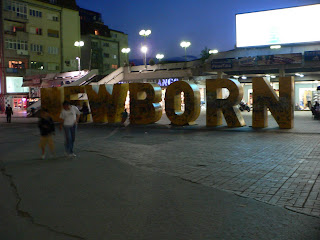Kosovo is a truly bewildering and fascinating place. Having been there a few weeks previously, it was nice to come back and learn a bit more about the world's youngest state.

Kosovo's independence monument
It is a place of stark contradictions: deep in an apparently intractable political quagmire, yet its capital, Pristina, exhibits an incredible dynamism and energy. People are extremely friendly, warm and open, and yet I sensed a very dark underbelly to Kosovan society, confirmed by a tale of a friend of a friend - an international - who whilst worked establishing the telecoms network following the war was spied upon and had her flat repeatedly burgled. She had lived happily in Beirut, but (understandably) couldn't handle Pristina, and left without seeing out her contract.
Kosovo, and especially Pristina, is like a Disneyland of bizarre new buildings, lending the place a surreal air. The road between the airport and Pristina is dotted with endless petrol stations and brand new, stand-alone furniture shops, with barely any stock and no customers. Foreign aid (and its illicit mistress, rampant corruption) have led to building frenzy, with little thought on their actual use. Old buildings are very hard to find in Pristina, and where they do stand they feel out of context, not least because the street level often comes halfway up the first floor.
Then there's the enormous presence of the internationals. Kosovo is a who's who of multilateral organisations. (The same un-PC colleague described it as 'Africa without blacks'.) The country's graced by the presence of UNHCR, UNDP, EU, OECD, NATO, as well as just about every international NGO, not to mention the controversial NATO force in Kosovo, K-FOR. The OECDs modern skyscraper office is such a landmark that it's proudly displayed on postcards.
The presence of so many internationals mean there are lots of very good restaurants and high-end shops in Pristina. Kosovo is one of Europe's poorest countries, but these restaurants are a haven for foreigners and wealthy locals. The conversations I overheard there were all in impeccable but clearly non-native English.
At the end of our first day's work our local partner in Kosovo, Ertjan, drove us out of the city to Germia park: the long, lush park that snakes out of the city centre to a high peak a few miles out of town. Ertjan is understandably proud of the beautiful park, though he noted with scorn that the numerous new houses scarring the pristine environment were illegal buildings. Apparently most are owned by members of government, who have no trouble in securing the necessary permissions to get away with it. Under the Serb control this never happened.
The park bore witness to the Serb's last stand in Kosovo, as the peak's panoramic views made it an obvious choice for the Serb army's command base. It also made it an easy target for the NATO forces in '99, and there are still huge craters there testifying to the size of the bombs dropped. Near the crater I saw a modest yellow sign denoting a landmine. It was the first such sign I'd ever seen and in my enthusiasm I almost bounded over to have a closer look.

The work itself went very well. Our two-day training workshop passed off successfully, despite the angry dwarf who burst in near the end to denounce virtually everyone as either corrupt, stupid or fascist. The conference we held on the final day, which aimed to strengthen the relationship between civil society and government, was a tempestuous affair, with the government representatives getting a rough ride. They responded fairly well, and I almost felt sorry for them, until I later learned that they had been guilty of a cynical piece of spin: they'd decried a recent protest in which the protesters had killed chickens by 'smashing them on the concrete' outside parliament; I later found out that actually the protesters had released 120 chickens (one for each MP in the Kosovan parliament) into the parliamentary gardens, only for them to be exterminated by government-hired pest controllers. It was a bizarre and fitting twist at the end of my brief visit.

No comments:
Post a Comment